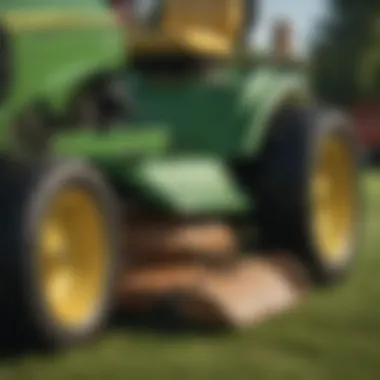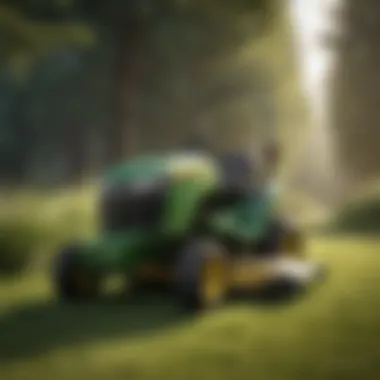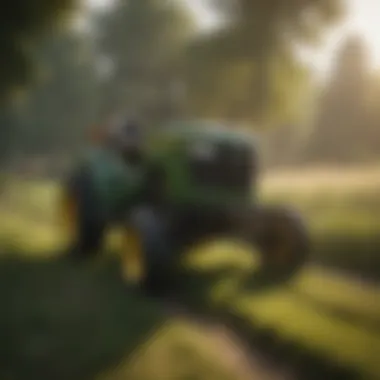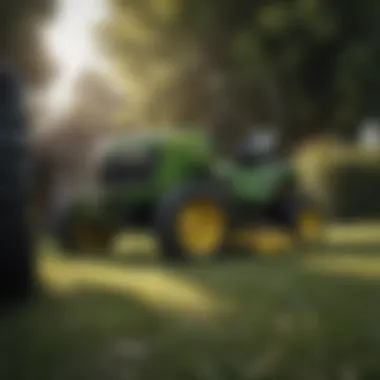Assessing Your John Deere Mower's True Value


Intro
Evaluating the value of John Deere mowers is a critical task for owners and potential sellers alike. Understanding the worth of this vital equipment can significantly affect decisions related to buying, selling, or maintaining the mower. This guide aims to pprovid a thorough approach to determining the appraisal of John Deere mowers by examining its critical factors, current trends, and methods to accurately assess its value.
Overview of the Topic
Definition and Importance
Current Trends
In recent times, several factors have been observed in the mower market. The demand for used mowing equipment has increased significantly due to the rise in interest in personal landscaping and home maintenance. Additionally, seasonal trends influence pricing; earlier in the spring, when demand surges, prices are usually higher. Furthermore, economic factors like inflation and supply chain issues can also affect the valuation process.
Key Techniques and Practices
Step-by-Step Guide
- Research Market Rates: Start by reviewing recent sales and listings for similar mowers on platforms like Facebook Marketplace or Reddit. Take note of the average price range.
- Assess Condition: Inspect your mower closely. Look for any wear and tear, rust, or mechanical issues that could lower the value.
- Document Maintenance History: Gather records of all maintenance and repairs. This demonstrates transparency and can increase buyer trust.
- Consider Upgrades: If you have made any enhancements or upgrades, note them, as they can positively impact the value.
- Get Professional Appraisal: If still unsure, consider consulting a professional to get an accurate assessment.
Tools and Equipment Needed
- Inspection Tools: Wrenches, screwdrivers, and cleaning tools to inspect and clean the mower.
- Documentation: Keep all maintenance records and receipts.
- Market Research Tools: Access to local classifieds or online platforms for comparison.
Challenges and Solutions
Common Obstacles
Many owners encounter difficulties in determining their mower's worth due to lack of sufficient market knowledge. Mowers may also have depreciation factors associated with age, which can confuse potential sellers.
Innovative Solutions
Using online valuation tools can significantly ease the appraisal process. Websites dedicated to equipment valuation often provide calculators that factor in equipment condition, age, and market trends. Additionally, engaging with communities on platforms like Reddit or Facebook can yield valuable insights into local market dynamics.
"Understanding the valuation of your mower is more than just numbers. It’s about informed decision-making that impacts your financial outcomes."
By following these guidelines, owners and sellers can confidently determine the worth of their John Deere mower, navigating challenges intelligently while seizing opportunities in the market.
Understanding the Value of Your John Deere Mower
Understanding the value of your John Deere mower is essential for owners and potential sellers. For individuals investing in lawn care equipment, knowing the worth of their John Deere mower can impact decision-making significantly. It helps in negotiating prices during resale and can guide decisions about purchasing new equipment. Assessing value can lead to a better understanding of market dynamics, enhancing the potential return on investment.
The Importance of Assessment
Assessing the value of a mower is crucial for several reasons. First, it enables owners to make informed decisions whether they are selling or maintaining their equipment. Regular assessments also reveal how well the mower has held its value over time, which can reflect on its condition and demand in the market. Additionally, understanding the mower's worth can assist in effective budgeting for future equipment purchases.
Factors also evolve in importance depending on the individual mower and market conditions. Therefore, keeping up with assessments can aid in maximizing financial restitution.
Factors Influencing Mower Worth
Several factors determine the worth of a John Deere mower. Each aspect contributes to the overall valuation and deserves attention.
Model and Age
The model and age of a mower greatly influence its market value. John Deere mowers are built with specific features that cater to various segments of the market. Popular models like the John Deere X350 or Z335E maintain their value over time due to their reliability and brand reputation. The age of the mower matters because newer models often have upgraded features and technologies that can attract buyers.
As a general rule, older models will depreciate faster than newer ones. This can deter potential buyers if the model doesn't have unique features appealing in the current market.
Condition and Maintenance


The condition of the mower substantially affects its worth. A well-maintained John Deere mower often retains higher value compared to one that has received minimal care. Regular maintenance not only prolongs the life of the mower but also enhances its functionality. Elements such as the sharpness of the blades, regular oil changes, and overall cleanliness can be pivotal.
Documentation of maintenance history serves as evidence to potential buyers, reassuring them of the mower’s condition. Lack of maintenance might result in a significant depreciation, making it harder to sell.
Market Demand
Market demand is another critical factor influencing mower worth. The agricultural and landscaping sectors can experience fluctuations in demand based on seasonal changes and economic conditions. For instance, during peak mowing seasons, demand may rise, thus increasing resale values. Conversely, during off-peak times, the market might see slumps in pricing.
Knowing the current trends can aid sellers in timing their selling process. Researching local demand helps in setting values more accurately and might yield better selling opportunities.
"Understanding the factors that impact your John Deere mower's value helps you make smarter decisions while buying or selling your equipment."
In summary, a combination of the mower's model and age, its condition and maintenance history, and the prevailing market demand all contribute to its worth. By understanding these aspects, owners can approach their mowers with keen awareness, enhancing their readiness for future transactions.
Methodologies for Value Determination
Understanding how to determine the worth of your John Deere mower is essential for anyone considering selling their equipment. The methodologies for value determination provide a systematic approach to assessing your mower's market potential. This section discusses various techniques available to owners and sellers, emphasizing their significance in achieving an accurate valuation.
Comparative Market Analysis
Local Listings
Local listings play a crucial role in evaluating the worth of a John Deere mower. By examining local classified ads and sales listings, you can get a clear picture of what similar models are selling for in your area. The key characteristic of this method is that it reflects real-time market conditions and pricing.
Local listings are beneficial because they allow sellers to see what buyers are actually paying. This gives insight into competitive pricing strategies. One unique feature of local listings is that they often cater to specific markets or regions. As a result, prices may vary significantly based on geographic demand. Using this method, one can ascertain how much other sellers are asking, thus setting a price that’s competitive yet fair. However, the drawback is that local listings may not always represent the broader market trends.
Online Marketplaces
Online marketplaces like eBay and Craigslist are important for broadening one's understanding of mower valuation. They allow access to a larger pool of sales data. The key aspect of these platforms is their extensive reach, which encompasses various geographical areas and demographics. This diversity leads to more comprehensive insights into pricing trends.
One unique feature of online marketplaces is the availability of search filters, which enable users to compare similar models quickly. Sellers can view how various factors like model year and condition affect pricing. The advantage of this method is the ability to access countless listings from various sellers, increasing the understanding of what one might expect for their mower. However, too much data can sometimes lead to confusion without a focused approach.
Utilizing Valuation Tools
Agricultural Equipment Guides
Agricultural equipment guides provide detailed information on the worth of John Deere mowers. These guides often come with historical data, market trends, and average pricing based on model and age. The adaptability of these guides makes them a popular choice for someone seeking a reliable value estimate.
Focusing on the unique feature, many of these guides are updated regularly to reflect current market conditions. They enable users to see how pricing has changed over time, which is invaluable. While they offer substantial benefits, one must be cautious as these guides may not account for local market fluctuations or specialized conditions that can impact a mower's value.
Online Calculator Tools
Online calculator tools are effective for estimating the worth of your mower based on various data inputs. These tools typically ask for model, age, and condition. The key characteristic is that they give a quick result based on standardized data. This makes them accessible and convenient for users who may not want to invest significant time into a detailed analysis.
A unique feature of these tools is their ability to instantly adjust values based on input changes. Therefore, if you change a detail about the mower, the calculator can quickly show how that affects the overall worth. However, one limitation of these tools is their reliance on generalized data, which might not align with specific market conditions.
Professional Appraisal Services
Professional appraisal services offer a comprehensive assessment of your John Deere mower’s worth. These services involve certified appraisers who inspect the equipment and provide a detailed report on its value. This approach is particularly useful for unique or high-end models where market data may not be sufficient to determine an accurate price.
The key advantage is the expertise these professionals bring. They apply thorough knowledge of market conditions, model specifics, and regional pricing dynamics. While this method provides the most reliable estimate, it can be more expensive and time-consuming compared to other methods. Nonetheless, for those looking for a definitive answer, a professional appraisal can be invaluable.
The Effect of Model Variations on Value
Understanding how different models of John Deere mowers affect their worth is essential. Various models have distinct features, specifications, and market popularity. This affects resale prices and buyer interest. Recognizing the nuances between models helps sellers effectively position their mower in the marketplace for a better sale outcome. Buyers, on the other hand, gain insight into which model might offer them the most value for their needs.
Popular Models and Their Resale Value
John Deere X350


The John Deere X350 is a well-regarded lawn tractor known for its versatility and performance. It features a strong engine and a comfortable operator platform. One key characteristic of the X350 is its ease of use. The hydrostatic transmission allows for smooth operation, making it accessible to inexperienced users. Additionally, the mower’s durability helps maintain its value over time. Owners jeer from its reliable performance and low maintenance costs. The downside may include a higher initial purchase price compared to economy models.
John Deere Z335E
When discussing the John Deere Z335E, it becomes clear that this zero-turn mower is designed for efficiency. Its notable feature is the ability to cut grass tightly around obstacles, thanks to its unique steering capabilities. This function makes it popular among homeowners with complex lawns. The Z335E is also equipped with a powerful engine, ensuring high-speed mowing. However, potential buyers should consider that its design is more suitable for smaller yards due to limited cutting width, which may not appeal to those with larger properties.
John Deere L120
The John Deere L120 stands out as a solid choice for medium to large yards. It is lauded for its robust build and features a powerful engine, making it well-equipped for tackling larger mowing tasks. A major advantage of the L120 is its comfortable seating and ease of control, which enhance user experience during extended mowing sessions. However, it may lack the advanced technology present in newer models. This can be a disadvantage for buyers looking for state-of-the-art features but ensures it remains a reliable mower at a competitive price point.
Emerging Models and Trends
The landscape of John Deere mowers is constantly evolving with new models. Buyers look for innovative features that improve efficiency and ease of use. Emerging trends include electric mowers, which promise to be more environmentally friendly. These models often have lower operational costs, appealing to eco-conscious consumers. Technology integration, such as smart systems for remote monitoring and maintenance reminders, is also gaining traction. As these trends develop, understanding their impact on value will be crucial for both sellers and buyers in the mower market.
Condition Assessment Techniques
Evaluating the condition of your John Deere mower is a pivotal step in determining its worth. A comprehensive assessment not only establishes the mower’s overall state but also highlights areas needing attention. This serves as a basis for setting a realistic price for potential buyers, or for your own understanding before a sale. By analyzing specific elements like physical appearance, engine performance, and operational functionality, you can gain valuable insight into the equipment's current value and potential resale price.
Physical Inspection Checklist
Exterior Inspection
The exterior inspection is crucial in identifying visible damage or wear on the mower. This inspection includes checking the body for dents, rust, and scratches, all of which can impact the mower's aesthetic and functional appeal. A mower with a well-maintained exterior typically fetches a better price in the market, as appearance often plays a significant role in buyer perceptions. Additionally, the presence of original paint and absence of corrosion can indicate a more meticulously cared-for machine, thus increasing its worth. However, some minor surface blemishes may be easily fixed and should not heavily influence the overall assessment.
Engine Condition Analysis
Engine condition analysis is a vital aspect of assessing your John Deere mower’s value. This evaluation encompasses checks on fluid levels, the state of the oil and filters, and any visible leaks. A well-maintained engine not only adds to the mower's reliability but also signals to potential buyers that the machine will perform efficiently. If the engine responds well during tests, such as starting without difficulty and running smoothly, it can boost the overall worth significantly. Conversely, issues such as an expired warranty or poor engine performance can lessen appeal and devalue the mower.
Operational Checks
Operational checks are intended to ensure the mower functions correctly across different settings. This may include testing cutting mechanisms, speed settings, and handling comfort. If a mower operates seamlessly, it enhances buyer confidence and implies lower maintenance requirements for the new owner. Conversely, any operational anomalies, such as uneven cutting or unusual noises, could raise red flags and negatively affect its market price. Overall, these checks provide a holistic view of the mower’s usability, ensuring potential buyers can make informed choices.
Documenting Maintenance and Repairs
Thorough documentation of maintenance and repairs can significantly influence the perceived value of your John Deere mower. Having a clear record of service history demonstrates responsibility and care, factors that potential buyers often seek. Regular maintenance, such as oil changes and blade sharpening, not only extends equipment life but also strengthens your case during negotiations. Conversely, lack of documentation can lead to skepticism about the mower's condition and raise doubts regarding its future reliability. As such, keeping meticulous records is not just advisable but essential for maximizing your equipment’s resale value.
Market Dynamics Influencing Prices
Understanding market dynamics is crucial when determining the value of your John Deere mower. Prices fluctuate based on various factors, and being aware of these can help you set realistic expectations. Whether you are a seller looking to maximize profit or a buyer wanting to make an informed decision, insight into market conditions provides a better framework for understanding worth.
Seasonal Variations in Demand
Seasonality can significantly affect the pricing landscape for John Deere mowers. Generally, demand peaks during spring and early summer, when homeowners and farmers engage in yard maintenance and land preparation. During these months, prices may also climb, reflecting the increased demand for quality lawn equipment. In contrast, winter months often see a drop in interest. As a potential seller, timing your sale to align with these peak seasons can enhance your mower's market presence.
Consider the following:
- Selling in Spring: Listings made during these months attract more buyers.
- Winter Discounts: Many sellers reduce prices in winter to clear inventory, which can affect overall market value.
"By understanding seasonal trends, sellers can better navigate their selling strategies to maximize profit."
Regional Differences in Pricing
Market nuances vary not only by season but also by region. Factors such as geographical climate, local economy, and agricultural practices lead to varied pricing across different areas. For example, rural regions with more substantial agricultural activities may have a higher demand for durable mowers suitable for extensive land. In contrast, suburban areas with smaller lawns may command less for similar models.
Key considerations include:
- Local Agricultural Practices: Regions heavily involved in farming may prioritize robust, multi-purpose mowers, affecting their resale value.
- Economic Conditions: Areas with higher disposable income often have inflated prices due to competition among buyers.
- Climate: In climates with longer growing seasons, demand for lawn care equipment can remain steady year-round.
Understanding these dynamics can lead to more strategic decisions in pricing and selling your John Deere mower.


Selling Strategies for John Deere Mowers
Selling a John Deere mower effectively requires understanding strategic methods that can significantly enhance the resale value. Effective selling tactics not only help in attracting potential buyers but also ensure that the seller receives a price reflective of the mower's true worth. In this section, we will explore optimal timing for sales, effective advertising approaches, and negotiation tactics that will facilitate a successful transaction.
Optimal Timing for Sales
The timing of when to sell a John Deere mower can greatly impact its selling price. Seasonal trends often dictate the demand for lawn and garden equipment. For instance, selling in spring when lawns are lush and maintenance needs grow can yield better prices. Conversely, selling in the fall or winter may result in lower interest, as most individuals are not considering lawn care equipment during these times. Understanding these dynamics can help improve sales outcomes by aligning with market behaviors and regional needs.
Effective Advertising Approaches
Effective advertising is crucial when attempting to reach potential buyers. The right approach not only increases visibility but also entices interested parties to inquire further into the listing. There are two primary strategies for advertising: utilizing online platforms and applying local selling techniques.
Utilizing Online Platforms
Using online platforms for advertising John Deere mowers is an efficient way to reach wider audiences, often leading to quicker sales. Websites such as Craigslist, eBay, and specialized agricultural equipment sites cater to buyers actively looking for mowers. The key characteristic of these platforms is their ability to showcase listings to a diverse demographic, maximizing exposure. Online listings can include photos, specifications, and maintenance history, which enhance buyer confidence in the product.
However, the downside can be the competition present on these sites. Many sellers may have similar listings at varying price points, which can create a price pressure environment. Nonetheless, effective use of engaging descriptions and high-quality photographs can set a listing apart from others.
Local Selling Techniques
Local selling techniques leverage the immediate community to find potential buyers. Strategies such as placing ads in local newspapers, utilizing community bulletin boards, or even word-of-mouth can effectively generate interest. A key characteristic here is the connection to the local market, often resulting in quicker face-to-face interactions. These interactions can build trust, which is especially important for larger purchases like mowers.
While advertising locally is beneficial, it can limit the audience size. However, engaging with neighbors or local gardening clubs can often lead to interested buyers who appreciate seeing the product in-person before making a decision.
Negotiation Tactics
Once potential buyers are engaged, employing effective negotiation tactics can impact the final selling price significantly. Presenting a clear value based on the mower's condition, maintenance history, and market comparisons can establish a strong negotiation position. Being prepared to answer questions and justify the asking price fosters buyer confidence.
Furthermore, remaining flexible during negotiations can facilitate smoother transactions. For example, being open to offers slightly below the asking price may bring a more rapid sale without underselling the mower's actual worth.
By implementing these strategies effectively, sellers of John Deere mowers can enhance their likelihood of achieving a favorable sale, ultimately reflecting the mower's true market value and ensuring a satisfying selling experience.
Understanding Depreciation Rates
Evaluating the worth of your John Deere mower involves several considerations, and understanding depreciation rates is critical. Depreciation refers to the reduction in value of an asset over time due to wear and tear, market trends, and other factors. This aspect is particularly important for mowers, as their value can significantly drop as they age and accumulate usage. Knowing how depreciation works helps owners set realistic expectations for resale values and allows for informed decision-making regarding maintenance and upgrades.
Factors influencing the depreciation of mowers can vary widely. Some models retain their value better due to brand reputation or specific features. Meanwhile, others may depreciate faster due to lower demand or lesser-known brand associations. By understanding these trends, owners can optimize their investment in their mower and determine the best time to sell.
Factors Affecting Depreciation
Several key elements impact the depreciation of John Deere mowers.
- Model and Specifications: Different models come with varying features which can affect their durability and demand in the market. Premium models typically have slower depreciation.
- Condition: The physical state of the mower plays a significant role. Mowers that are well-maintained usually endure less depreciation compared to those with visible wear and tear.
- Usage: The amount of time and intensity with which a mower has been used is another crucial factor. Heavy usage translates to greater depreciation.
- Market Trends: Changes in demand and technology can influence depreciation. For instance, a surge in demand for electric mowers may affect the resale value of gas-powered mowers.
- Economic Conditions: Broader economic factors can impact resale prices. In a tight economy, the value may decrease more sharply due to reduced buyers.
Understanding these factors allows you as a seller to better manage expectations regarding your equipment’s value.
Calculating Current Value Based on Age
To determine the current value of your John Deere mower based on age, consider a few straightforward steps. Start by identifying the original purchase price. Then, adjust this figure based on a standard depreciation rate for similar machines. It’s helpful to refer to industry guidelines or depreciation tables for mowers.
Here’s a basic method to calculate current value:
- Initial value: The price you paid for the mower.
- Average annual depreciation: Mowers can lose about 10-20% of their value each year depending on their condition and usage.
- Estimated age: How many years have passed since the purchase?
You can use the formula:
For example, if your mower was originally purchased for $3,000 and, assuming a 15% annual depreciation rate, after three years, the calculation would be:
This estimated current value gives a useful guideline for setting a resale price, although market conditions and buyer demand should also be considered.
Accurately calculating the depreciation and current value helps ensure that you make informed decisions about your mower's resale potential.



